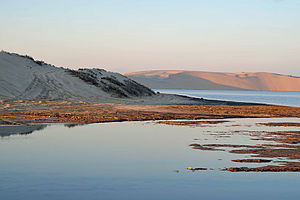Battle of Tups
| Battle of Tups | |||||||
|---|---|---|---|---|---|---|---|
 Tups, the coastal waters where the battle occurred | |||||||
| |||||||
| Belligerents | |||||||
|
|
| ||||||
| Units involved | |||||||
| South Sea Fleet | |||||||
| Strength | |||||||
| 175 combatant vessels | |||||||
| Casualties and losses | |||||||
| 115 vessels lost | |||||||
The Battle of Tups (Shinasthana: 濧之海役, tups-tje-hme-les) was a naval battle between the Yi-Menghean and Drjen-Themiclesian navies, close to the coastal waters of modern-day Naseristan. Following the Battle of Portcullia, it saw more extensive and decisive use of gunpowder and is believed to be the most devastating naval battle in the world up to that time, though boarding still dominated the battle and was responsible for most casualties. The Menghean navy, riding on its superior strategy and tactics, defeated the refurbished and enlarged Themiclesian fleet to acquire near-undisputed control over Meridian waters and access to ports on the Meridian coast.
Background
During the Battle of Portcullia in 1324, the Yi fleet engaged a detachment of the Drjen South Sea Fleet, outnumbering and defeating it decisively. The bulk of the Drjen fleet, however, was not at the battle; the Themiclesian court thought the defeat was a minor setback that could and should be avenged. Nevertheless, measures were undertaken to recover as much advantage as possible. Foremost was the doubling in size of the South Sea Fleet, number by 1345 over 200 warships. Gunpowder was also introduced and experimented upon extensively in Themiclesia, ultimately producing more than 4,000 guns for the entire fleet. The Finance Secretary, who controlled the fleets, named it the "unmatched fleet" (無敵之航, mja-tiak-tje-gang). Themiclesia had spent more than 50% of its revenues on this fleet for ten consecutive years, and in coastal waters it simulated battles to train its crew for combat.
Engagement
Aftermath
Analysis
Naval historian M. Parker describes Themiclesia's preparation for this war as a "brute force" policy of "having more of everything but thinking little of their effectual use".